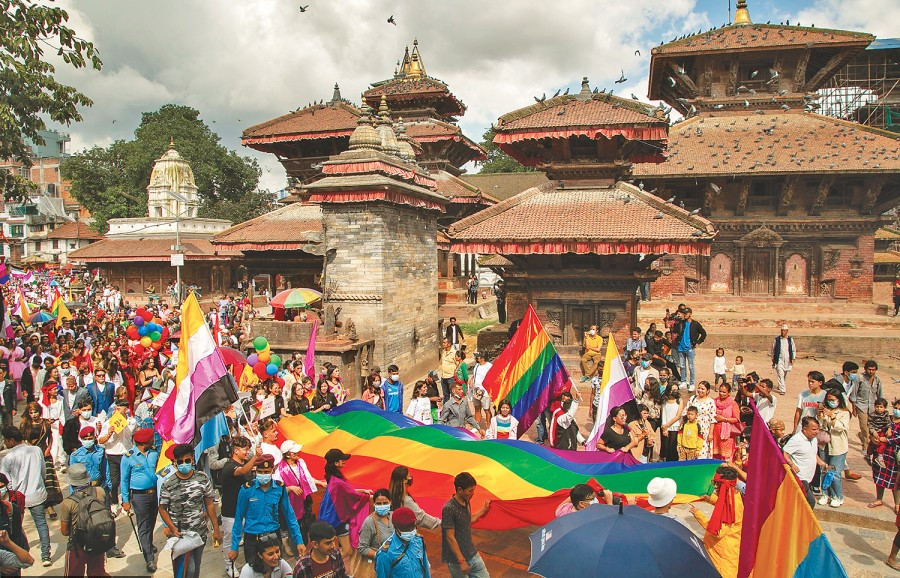Columns
LGBTQIA inclusion in Nepal’s economy
Bringing queer travellers in the country can give the tourism industry a notable boost.
Anurag Gupta
There has been significant progress in the last two decades in LGBTQIA rights worldwide. Governments across the globe have increasingly embraced marriage equality and taken important steps to prevent discrimination against the queer community. Starting with the Netherlands in 2001, 36 countries have now legalised same-sex marriage, while many others have decriminalised homosexuality.
Nepal has stood out as a beacon in advancing LGBTQIA rights. Progressive court judgments have ruled in favour of the queer community, enabling them to secure legal recognition and the right to live with dignity and freedom. Despite the judiciary’s support, much needs to be done to build wider social acceptance of the community’s issues. With these challenges, an emerging perspective views LGBTQIA inclusion from a different lens. Queer rights are generally framed in the context of human rights, but with recent advancements in data and research, there is a growing economic case that supports LGBTQIA inclusion.
Although estimates vary between surveys, around 9 percent of adults globally identify as LGBTQIA, which roughly translates to 700 million individuals. This large number makes for a sizeable consumer base that businesses can’t afford to overlook. Their collective annual spending power (also known as pink money) stands at $4.7 trillion, and it is steadily growing. This number is 100 times the size of Nepal’s current GDP. This robust purchasing power stems not only from the size of the LGBTQIA population but also from their higher disposable incomes, as they have fewer children and less financial responsibility compared to heterosexual people.
The substantial spending capacity allows the community to exert significant influence on markets. Brands are steadily recognising this emerging consumer base and tailoring their services to meet their unique needs. The global corporate world has actively supported (for the most part) LGBTQIA inclusion and emerged as a strong advocate for their rights. Nepali businesses are yet to show the same enthusiasm as pink money could bring lucrative opportunities in the country, especially in the tourism industry.
The ‘rainbow tourism’ segment is a multi-billion dollar market, and given tourism is one of the mainstays of Nepal’s economy, success in bringing queer travellers home can give the industry a notable boost. A study shows that gay men travel more frequently than straight people. Attracting them to visit a country means meeting their unique demands and ensuring safety, which becomes a key factor in their travel decisions. Nepal has already established its image as a queer-friendly nation internationally, thanks to successive court rulings that have upheld the rights of the LGBTQIA community. This puts domestic businesses at an advantage in attracting queer travellers and securing a share of the growing pink money.
As the country offers unique natural landscapes and breathtaking vistas, Nepal has a huge opportunity to be an LGBTQIA wedding and honeymoon destination. The country is also well-placed to offer wellness retreats and immersive experiences that could appeal to the queer community. Nepal is located between China and India, which top the rankings in LGBTQIA purchasing power capacity. With annual tourist arrivals stuck at the 1 million mark, tapping into this neighbourhood market can push the figures. Nepal’s geographical, economic and legal factors give it a competitive advantage in capitalising on the rainbow tourism segment.
Beyond tourism, LGBTQIA inclusion also impacts labour outcomes. Inclusive policies can materially raise productivity levels when there is a sizeable number of queer individuals in the labour force. Research confirms that legal protection for the queer community leads to enhanced economic growth, better firm performance and improvements in health and labour indicators. LGBTQIA-inclusive policies lead to increased innovation in the startup ecosystem and a rise in patent registrations, as they allow queer individuals to participate more fully in economies without the fear of prejudice or exclusion.
Moreover, such policies enable businesses to reduce their turnover rates. When firms create inclusive workplaces, fewer queer employees leave because of discrimination, potentially leading to savings from reduced rehiring costs. With a strong legal framework for protecting queer individuals already established in Nepal, domestic businesses have the opportunity to tap into the talents of queer workers and bring new perspectives to their organisations. As diversity, equity and inclusion (DEI) in workplaces tangibly improve business problem-solving ability, corporations globally have integrated this into their company culture. The unique perspectives and experiences of LGBTQIA individuals give them a competitive edge, making a strong case for firms at home and abroad to prioritise DEI initiatives.
Nepal has demonstrated praiseworthy advancements in providing legal recognition for the LGBTQIA community. The purpose of this article is to not view LGBTQIA rights in the isolation of money and profit, instead, it aims to provide a fresh perspective that queer inclusion makes strong economic sense in Nepal. While the broader issues of social acceptance and political prioritisation remain to be addressed, it is imperative to acknowledge the economic benefits Nepal could gain from LGBTQIA inclusion and, by extension, all forms of social inclusion. With the increasing research in this area, the economic case for LGBTQIA inclusion is poised to become stronger, amplifying the voices of the queer community in advocating their rights and creating a more equitable world.




 18.12°C Kathmandu
18.12°C Kathmandu















